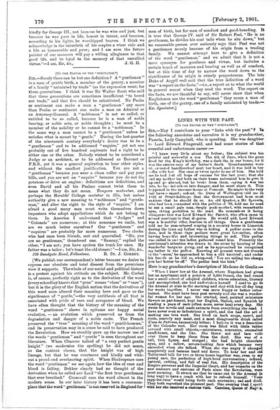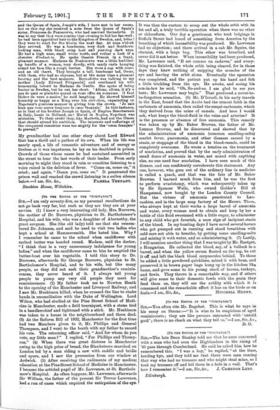LINKS WITH THE PAST. [To THE EDITOR OP TUB "
SPECTATOR."] Sis.,—May I contribute to your "links with the past" P In the following anecdotes and narrative it is my grandmother, Pamela, Lady Campbell, who is speaking. She was daughter to Lord Edward Fitzgerald, and had some stories of that
eventful and unfortunate career :-
" I knew very little about my father • the subject was too painful and sorrowful a one The 4th Of June, when the guns fired for the King's birthday, was a dark day in our house, for it was the anniversary of my father's death. Grandtuamma wore hi- co'oured handkerchief next her heart, and it was laid in her eeffin with her. She once or twice spoke to me of him. She told me he had lest all hope of success for the last year; that she and my nether had both on their knees entreated him to give it up and go abroad, but he broke from them, ,aying it was too late, he hail led others into danger, and he must share it. This happened in the summer-house at Preseati. 116 might. to the very last have ei caped ; indeed, the Duke of Wellington told me in [423 at Strathfieldsaye that the Government had been moat anxious that he should do so. An old Quaker, a Mr. Sprowle, who had been connected with the politics of '98, told me he used to see a small pale man, deeply pock-marksl, with remarkable eyes, riding postillion to the mail. He remembers it being whispered this was Lord Edward the Patriot, who often came to attend meetings in that di-guise. He would add, Lord Edward was a beautiful rider, fearless in all things. Once a gentleman told me he remembered staying in a country house in Limerick during the time my father was in hiding. A pedlar came to the door, and in those days pedlars were great favourites, often having beautiful and interesting things to sell. This pedlar was called in and the ladies gathered round him. Presently the gentleman's attention was drawn to the scene by hearing of the wonderful bargains going, and as he approached he recognised my father in the pedlar. Knowing all present were not friends to the cause,' he approached to buy a silk kerchief ; and under his bre.th as he did so, whispered,' You are selling too cheap; you had better be off.' The pedlar took the hint."
Here is my grandmother's description of Madame de Genlis "When I knew her at the Arsenal, where Napoleon had given her an apartment and a pension of 6,000 francs, she had round her a small school of adopted children, whose education, literary and accomplished, she had undertaken herself. I used to go to the Arsenal at nine in the morning and stay with her all day long for weeks together. I never was more happy or better enter- tained. She must have been past seventy and she was a wonder- ful woman for her age. She studied, read, painted miniature flowers on parchment, kept her English, Italian, and Spanish by reading a page of each (often more, never less) every day. She wrote her novels and made extracts from everything she read. I have never seen so industrious a spirit, and she had the art of making one love work. She lived on herb soups, sorrel, and roots, scarcely any meat, and a most disagreeable drink called L'eau de Pati.nee, excessively bitter; I believe it was a decoction of the Colombo root. Her room was filled with little tables covered with small objects,—miniatures, souvenirs, enamelled snuff-boxes, and the like. She threw net and lass veils over these to keep them from the dust. She was of a tall, thin figure, and stooped ; she had bright chocolate eyes, and a sallow, severe-looking face which became very animated when she talked. When she was angry it changed completely and became hard and fierce. To hear her and old Talleyrand talk for two or three hours together was, even to my young ears, the perfection of high-bred conversation ; refined, natural, cutting, and full of real fun. His description of the Empire parvenus and the Imperial Court, and her remarks on the new manners and customs of Paris since the Revolution, were most amusing. It struck me that he came out to the Arsenal (a long way) to have a crack with her to refresh himealf. 'Vous rappelez-vous' would bring forth such souvenirs; sad and droll. They both regretted the pleasant past. One evening that I spent with her she received a cu.rioua visit. Caroline, Queen of Naph and the Queen of Spain, Joseph's wife, I have met in her rooms, but on this day she received a note from the Queen of Spain's sister, Princesse de Pontecorvo, who had married Bernadotte. It was to say that they were coming that evening to bid her farewell : he had been appointed heir to the Kingdom of Sweden, and, helas ! they were to start for Ste kholm the next day. At nine o'clock they arrived. He was a handsome, very dark and Southern- looking man, with black crisp hair and piercing dark eyes. He had a high nose, small white teeth, and rather a look of a chevalier d'industi ie. He spoke Gaston French in a frank, pleasant manner. Madame de Pontecorvo was a little huddled- np bundle of a woman, very dowdy, with sandy curls hanging round her face like a rough terrier. She wore a cap with roses, and an old shawl. They brought a tall, handsome lad, Oscar, with them, who had no shyness, but at the same time a pleasant bearing and the best manners. Bernadotte was talking to my mother [Lady Edward Fitzgerald] and overheard his wife bemoaning herself to Madame de Geniis. She spoke of being buried in Sweden, but he cut her short. Allons, allons, it n'y pas de qnoi se plaindre quand on eons offre an royaume. 11 faut thcher de vous ci.nsoler,' he said laughing. He showed himself honestly as happy as a King over his elevation, expatiating on Napoleon's gracious manner in giving him the crown. Je sais bien que vous aurez toujours le l•ceur francais.' In this instance, as in that of his brother Joseph in Spain, of Eugene Beaubarnais in Italy, Louis in Holland, and Murat in Naples, Napoleon was mistaken. To their credit they, like Macbeth, had not the illness that should attend his ambition. The interests and sufferings of the conquered countries were too mighty for the ‘CO3tIr francais' to prevail."
My grandmother had one other story about Lord Edward that has a thrill and a pathos of its own. When his life was nearly sped, a life of romantic adventure and of energy as tireless as it was impetuous, he lay on his deathbed in prison. Crowds of those whose cause he had sustained assembled in the street to hear the last words of their leader. From early morning to night they stood in rain or sunshine listening to a voice raised in the delirium of fever. " Come on, come on," it cried ; and again, " Damn you, come on." It penetrated the prison wall and reached the crowd listening in a sullen silence Stockton House, Wiltshire.



































 Previous page
Previous page